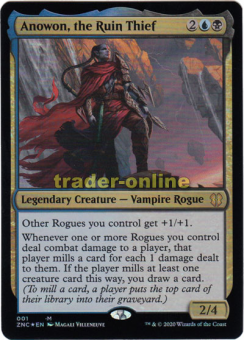

As you get more and more of these triggers into play you can cause a cascade of effects triggering off each other ending the game, and that’s primarily the goal. Anowon, the Ruin Thief makes players mill a card for each damage dealt to them, which can trigger mindcrank of Syr Konrad, the Grim, or trigger Psychic Corrosion, ditto. There’s a number of interactive triggers in this deck, so you’ll need to pay close attention to your board state. If you’re serious about tribal, he’s no rogue. Syr Konrad can go off just as well with Mindrank, though it’s not as consistent since it’s only creatures, but it pings every enemy player. Syr Konrad, the Grim has a similar damaging trigger when creatures enter graveyards. Bloodchief can easily get opponents dangerously low. There’s no paucity of wheels, looting ( faithless looting) style cards, paired with fetchlands. But even just getting a bloodchief ascension out is really dangerous for your opponents. The problem is this combo is so game-ending but slow, so obviously telegraphed it will most likely get blown up. Perhaps most notable of these is a simple, cheap, two-card combo that is unfortunately rather slow: Rogues slot nicely into this, because many of them have graveyard based bonuses, reanimation effects, mill themselves, and the dimir colors offer some ways to penalize your opponents for cards going into their graveyard. Given the dangers of running pure mill as a win condition, it’s probably best to use it rather as an enabler. One of the most common win cons in commander is Thassa’s Oracle / Jace, Wielder of Mysteries.Many decks run Eldrazi titans that force reshuffle.Finally it’s often hard to race the clock properly, decking someone before they can kill you (this is in standard play) in commander it’s probably even more dangerous on it’s face, for a number of reasons: Giving your opponent a huge selection of cards to play from their graveyard is therefore dangerous. At one time it wasn’t that uncommon for plays to essentially skip their first turn, so they’d draw and be forced to discard, discarding a huge fattie and reanimating it. Decks that reanimate for example, or can leverage their graveyard in various ways are often trying to self-mill, to get cards into the graveyard. Milling your opponent’s deck can actually enable his deck really powerfully. As a pure win condition though Mill is quite dangerous. Giving it a keyword instantly kind of increases the power level, because WotC can buff mill with cards like Bruvac, the Grandiloquent who essentially doubles your opponent’s milling, and they can also build in triggers like “whenever a play mills a card, do something“. It wasn’t really a mill deck per se, but just a strongly meta deck that beat the decks that other players were playing (a lot of sligh) and “put cards in your graveyard” “target player(s) puts cards in their graveyard” has existed on and off for a very long-time but only recently got a keyword. Mill has been around forever, named for the eponymous millstone, which was a feature of the deck that won the first world championship. Mill is another funny archetype and keyword. So it’s a lot of tricksy little interplays. There’s a heavy cross-over between rogues and faeries, with a lot of faerie rogues, and a lot of faeries and rogues in Dimir, and a lot of them also have flash and mill. Technically speaking, prowl isn’t actually rogue only it can be whatever matching creature type, but so far it’s appeared on rogues “Prowl ” means “You may pay rather than pay this spell’s mana cost if a player was dealt combat damage this turn by a source that, at the time it dealt that damage, was under your control and had any of this spell’s creature types.” Casting a spell for its prowl cost follows the rules for paying alternative costs in rules 601.2b and 601.2f–h. 702.76a Prowl is a static ability that functions on the stack.There’s even a rogue-centric keyword – prowl. Rogues are a nifty subtype with a focus on combat tricks, evasion, and various kinds of card selection and draw, tending to be small creatures, mostly blue and black, though with some nifty red ones as well. You fell into my cunning plan of, well proving something or other. I tricked you into correcting my spelling.


 0 kommentar(er)
0 kommentar(er)
